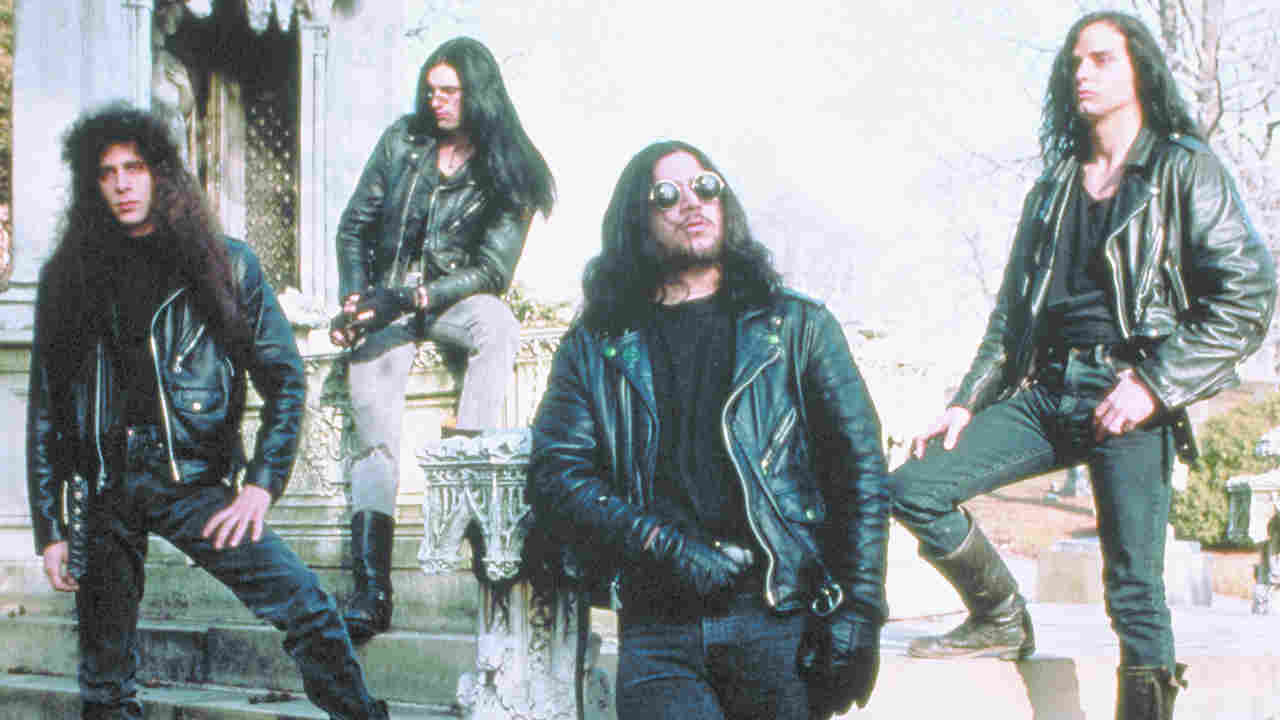“I was so difficult to deal with, but I wasn’t the only one in the band doing something that they shouldn’t have been doing”: how Deftones rose above turmoil and tragedy with Diamond Eyes
Deftones are one of modern metal‘s most acclaimed bands – and its most turbulent
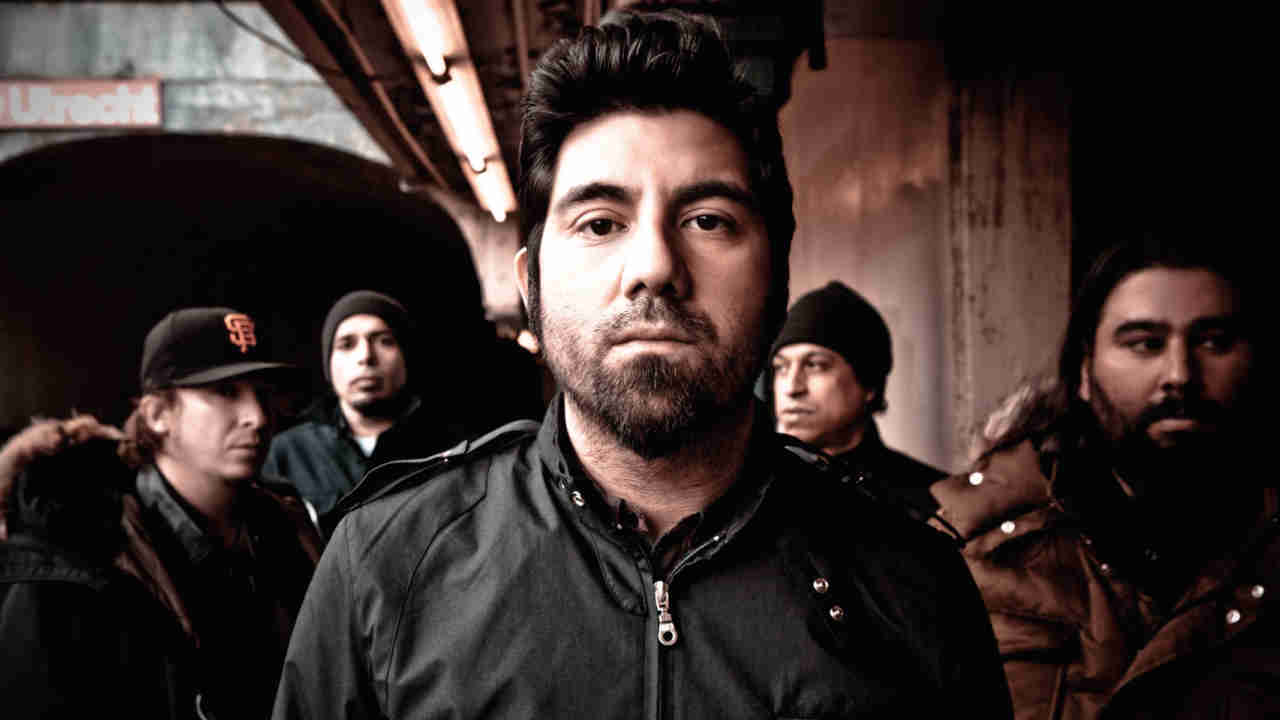
They may have emerged during nu metal’s infancy, but Deftones quickly carved their own path, becoming one of the most inventive bands of the last 30 years – and one of the most turbulent. In 2010, as the band prepared to release their sixth album, Diamond Eyes, singer Chino Moreno and guitarist Stephen Carpenter looked back over the highs and lows of their career.
There aren’t many bands in modern rock who’ve gone through as much as the Deftones. Through inner-band conflict, substance abuse, the tragedy of losing a member to a car accident and all sorts in-between, they remain one of the biggest bands within our stratum. They’ve outlasted nu metal, emo, metalcore and screamo (and they’ve been labelled in just about all of them) without ever altering their core sound. Ol’ Blue Eyes says he did it his way, but Deftones are the real deal.
Their seeds were sown in 1988, during seventh grade at a school in Sacramento, California. Abe Cunningham and Chino Moreno were classmates who would sit in lessons and spend their time like most other high school students: by taking apart a pair of headphones and running one ear up each of their sleeves and playing the then-recently released …And Justice For All by Metallica over and over again.
“I knew Abe played drums but there was a song on that record that he said he could play all the way through,” laughs a reminiscing Chino Moreno. “I was like, ‘No you can’t!’ I went to his house and he played the whole song. I had to take him to meet Stephen (Carpenter).”
Hailing from the same modest suburban neighbourhood of Sacramento as Chino, teenage guitarist Stephen had already taught himself how to shred. By this point, Stephen was already able to rip on the likes of Death Angel and S.O.D., and following Chino introducing the pair, the musical chemistry between Abe and Stephen was instantaneous.
“They were locked in straight away. Stephen’s jaw just hit the ground when he heard Abe play,” says Chino. “I saw Abe at school a few weeks later and he said he and Stephen had been jamming for a few weeks and they’d written a few songs and Stephen wanted me to sing.
“I didn’t know anything about heavy metal really, apart from a couple of Metallica records, so I didn’t know how to sing like that,” admits Chino. “I didn’t know how to sing but in junior high school, I used to rap. I loved The Smiths so I’d try to sing like Morrissey and I’d rap too, so I had no identity at all. All of those things are still in me and that’s made the uniqueness of what I do, I guess.”
Sign up below to get the latest from Metal Hammer, plus exclusive special offers, direct to your inbox!
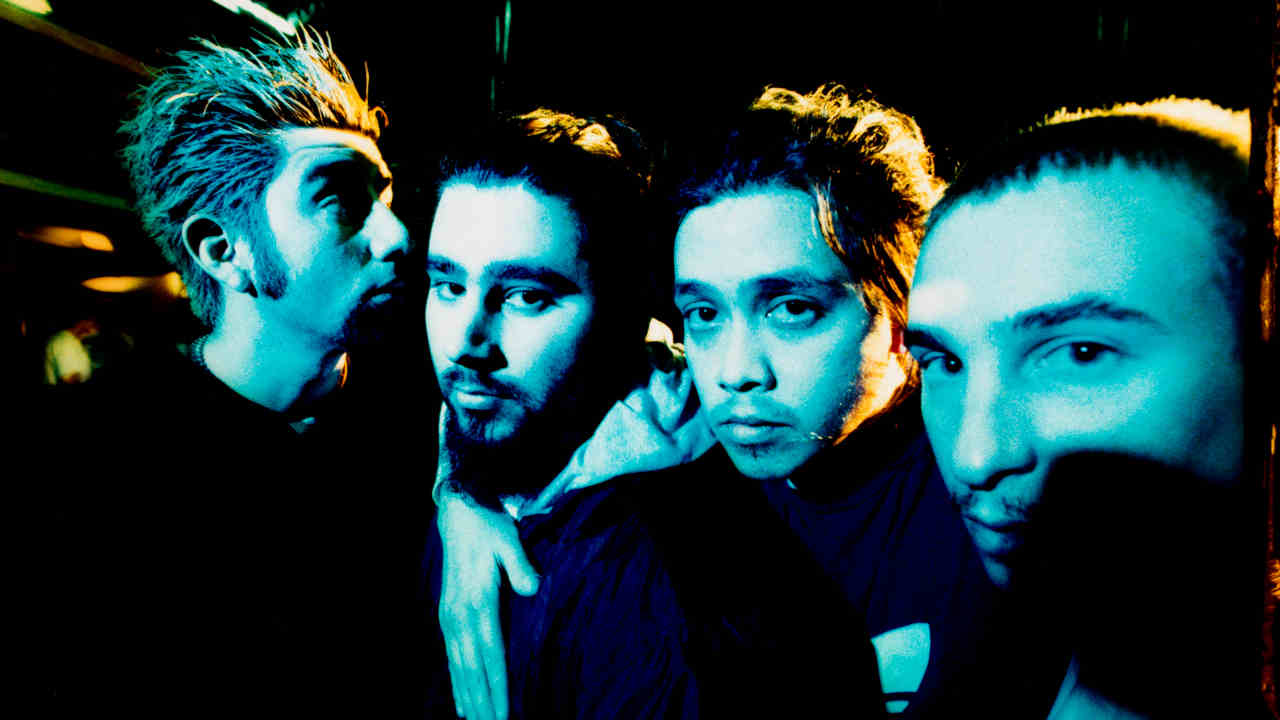
With bass player Chi Cheng completing the Deftones lineup, the young band wrote everything from reggae-rap to straight-up, balls-to-the-wall heavy metal in a crusade to cement their sound. Honing their craft locally in Sacramento, they formed their signature sound and hit LA to get themselves a deal, meeting fellow newcomers Korn in the process. After recording a demo with soon-to-be nu metal über-producer Ross Robinson, Chino says that people were already starting to spit jibes at the band and label them ‘baby Korn’.
“We were definitely grouped in with Korn,” says Stephen. “The only similarity was that we both made heavy music and we were both doing something that people considered exciting at the time, but I liked what those guys were doing.”
“We had to take our own road and not attach ourselves to any scene,” agrees Chino. “That’s something that’s always been our thing.”
Recruiting Pantera and Prong producer Terry Date and signing with Madonna’s Maverick label, Deftones recorded and released their debut album, Adrenaline. Alongside Korn and Incubus, Deftones were cited as pioneers for the burgeoning nu metal scene and riot-starting tracks like 7 Words and Minus Blindfold sound as fresh and club-ready in 2010 as they did upon their release.
“I’m not sure our mental capacity has ever been forward- thinking,” says Stephen, who laughs and reveals that his down-beat turn of phrase has earned him the nickname Negatron amongst his bandmates. “We try to do something that sounds good to us and that’s just about it. There’s never a masterplan behind what we do.”
“I couldn’t even say that we put that much thought into that record,” says a modest Chino. “We captured an energy and a youthful spirit that you can still hear and that still shows today but we were just excited to be recording an album.”
If the band fired early warning shots with their debut release, their sophomore effort, 1998’s Around The Fur, blew the fucking doors off. Maintaining the zip-and-bounce of their debut on the dancefloor-filling My Own Summer (Shove It), the band also began to extend their journey into the world of atmospherics with Chino’s other-worldly vocal delivery growing in stature tenfold, on an album that’s rightfully regarded as one of the most essential rock albums of the 90s.
“It’s funny, people always think it’s me who brought that other side to the band,” Chino shrugs. “It was Stephen who wrote Be Quiet And Drive (Far Away) and started building on our sound in that way and it just kind of worked for all of us.”
“I wrote Mascara too and that’s pretty mellow, right?” laughs Stephen. “I don’t always write the heaviest music. I write what I feel. I just feel the heavier stuff more often than not because that’s how I am as a guitar player.”
Riding universal acclaim for their bold leap forward on …Fur, its follow-up White Pony saw the band branching out further than ever before with Chino adding second guitar to the writing process but, due to his amateur ability, also adding an age to the band’s recording process.
“It slowed us down incredibly because he didn’t really know how to play guitar,” says Stephen. “That time when he was learning to play guitar was when we went from taking a year or less to make a record to two years or greater.”
“I sucked at guitar,” admits Chino. “I was learning to play and I didn’t really know what I was doing and I still don’t, but Stephen only recently admitted that it made him mad.”
“I still joke around with him about how I wish I could have learnt to play guitar in a band that was signed already,” Stephen concludes.
Through this sense of frustration, there were allegations within the press that a power struggle was starting to emerge between Chino and Stephen during the album’s creation.
“There wasn’t a power struggle,” says Stephen with point- blank directness.
“People don’t realise that me and Stephen wrote a lot of that record together and we were in the same headspace at the same time,” asserts Chino. “It wasn’t that I took control and mellowed out the band at all. We write well together because we’re both looking to push ourselves. It’s not that we want to out-do each other but we do try to out-do ourselves.”
Through all of the alleged creative control issues and added time to the band’s schedule, the Deftones created what is commonly considered their finest hour with White Pony. Fearlessly experimental and a true journey of an album, it’s a record that is rightfully revered as one of the best rock albums of the last decade and an essential purchase for anyone interested in alternative metal.
“Towards the end of the making of that record, we knew we had something special,” admits Chino. “When we were listening to the final mixes, we knew we were doing something that nobody else was doing, that had pushed ourselves and I felt great about it.”
White Pony saw Deftones hit new heights, landing at number three on the Billboard charts and taking in headline arena shows in the UK that included A Perfect Circle and Linkin Park serving as support acts at Wembley Arena and the now-defunct London Arena in Docklands respectively, as well as beating Pantera, Iron Maiden and Slipknot to win Best Metal Performance at the 2001 Grammys.
If it seems all fluffy kittens and rags-to-riches up to this point, prepare for a slight change in pace. If this were an episode of VH1’s Behind The Music, this would be the part where the music becomes sombre and the voiceover guy puts on his best serious voice…
Beginning work on their self-titled album (ironically, originally set to be titled Lovers), the band began to hit hard times in their personal lives.
“That’s the only album where the music was secondary to our personal problems,” says Chino. “We were all going through different things like divorce or drugs. It’s hard to really think back to that period because I was out of my mind!”
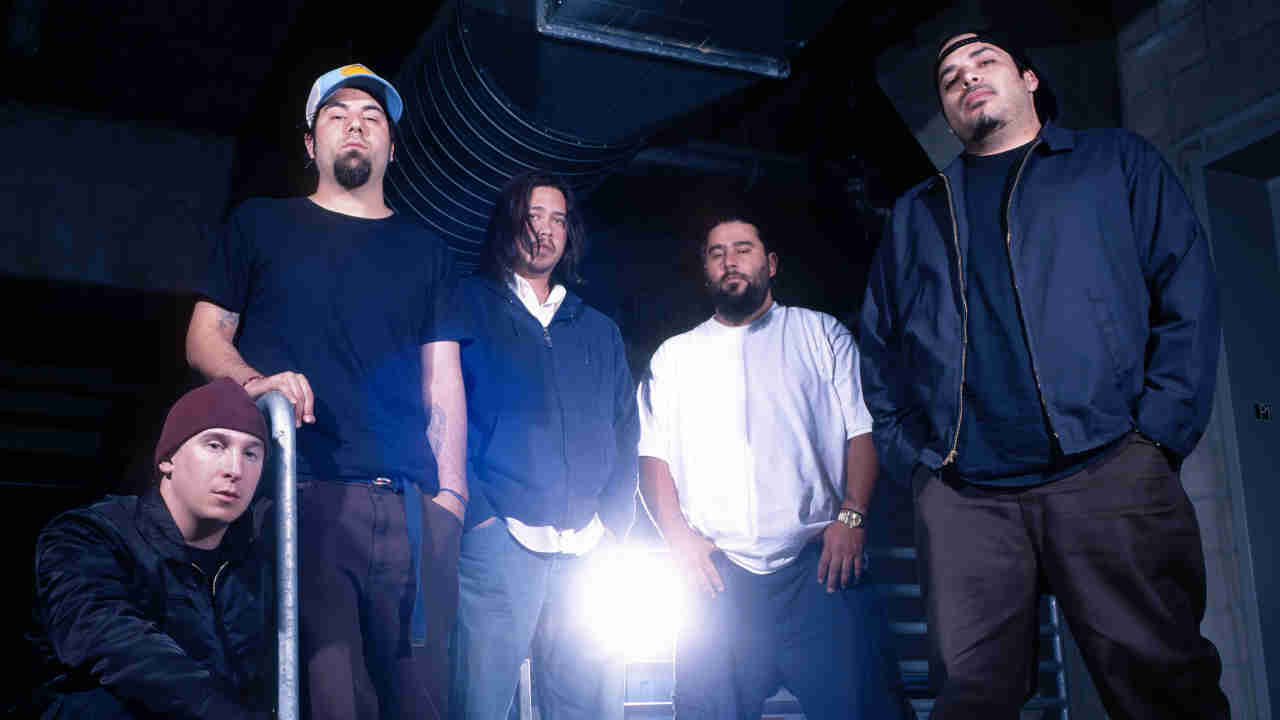
With Chino beginning to fight a war with drug abuse that was set to consume him for the next few years of his life, the personal problems that were coursing through the band’s lifeblood would start to cause a musical breakdown. With those reports of creative power struggles within the band rearing their ugly head once more, Stephen admits that he took a stand in the making of that album.
“When we got to the self-titled album, Chino would play the quieter stuff and little jangly things and me, as a guitar player, I made a stand on that record,” Stephen states. “I said, ‘If it’s not heavy, I’m not playing on it.’ I stuck to that. I was introduced to Meshuggah and I was consumed by their music and we’re a heavy band and I just wanted to play heavy-ass music and Chino wasn’t into that. We were as far away from each other musically at that point as at any point in our history.”
The band battled through their problems to create the most challenging and musically diverse collection of their career. While it stands as the most successful Deftones album in terms of chart positions in both the UK and the States (numbers seven and two respectively), the self-titled effort didn’t garner the widespread acclaim of any of the band’s previous outings and remains something of a love-hate album amongst the band’s fanbase. This feeling of indifference was to prove the least of the band’s worries, with Chino’s drug problem beginning to spiral out of control.
“I’d do whatever, mostly coke and speed, and get amped out of my mind,” admits Chino. “I’d think I was being produc- tive but I’d never finish anything. I’d drink a lot of Jamesons to bring me back down too. When things were bad, I’d just drown myself in the dirtiest shit I could do. For a whole lot of my career, I lived like I didn’t give a shit about the next day.
“That was probably why I was so difficult to deal with for those years, but I wasn’t the only one in the band doing something that they shouldn’t have been doing.”
Sessions on the band’s fifth album, Saturday Night Wrist, came to a grinding halt. With Chino continuing his stop-start style of working and then going on to complete an album with his ambient side-project, Team Sleep, his bandmates started to lose patience with their vocalist.
“It wasn’t a fun time at all,” says Chino. “I really lost my friendship with the band during that whole thing and there was something really personal which I will tell you because it never really gets spoken about. I heard they were talking about getting someone else to sing so they could finish the record. When I heard that I laughed, but I thought, ‘Could they really just do that to me?’ I believed it and I stopped communicating with them and I went and did Team Sleep and I didn’t do that out of defiance, I was going to do that anyway, but I left and I didn’t talk to any of them for six months.
“I still haven’t really confronted them about that whole thing because it’s not worth it,” says Chino. “But that was the main thing I look at and go, ‘Man, you knew me since I was eight years old and you guys would really get somebody else to record these songs because I’m having a hard time in my life right now? If I really am a drug addict then help me!’ and I felt like they were pushing me away and they probably felt that I was running away. It was a pretty deep time.”
Did you think about quitting the band?
“Yeah,” admits Chino. “I thought about it a lot during those times. During the self-titled and also during Saturday Night Wrist. When I was finished with my vocals on …Wrist I told the producer that it was the last Deftones album that I would ever put vocals on.”
“It wasn’t just me that considered [replacing Chino], it was all of us and it really didn’t have anything to do with him at the time,” said Stephen. “We had the music all done and he’s just going to bounce now and do Team Sleep before we’re finished? What the hell! Nobody wanted to replace him but nobody wanted to sit around and wait for him either.
“When he got back and we were clear that we were ready to move on and we put out B-Sides & Rarities, it lit a fire under Chino,” says Stephen. “The overall sound of …Wrist needed to go through that whole process to get to what you hear today. As wild a journey as that was, we were coming together as individuals by the end of that process and it was good for us and the vibes within the band have been good ever since.”
Saturday Night Wrist was released to moderate acclaim from fans and the press but, more importantly, the Deftones began to enjoy each other’s company for the first time in too long. Chino is currently two years sober of drugs, and the band’s shows on the Saturday Night Wrist tour were better than they had been since their arena-selling heyday. They were seemingly invincible.
Then tragedy struck. It was as the band were finishing up work on the album known as Eros that they took the biggest hit of their career. On November 4, 2008, Deftones bassist Chi Cheng was involved in a car accident in Santa Clara, CA that left him in a coma. Chi has come through a potentially fatal septicaemia infection and is currently in a minimally conscious state.
“It was one of the hardest things we’ve had to deal with in our lives,” says Chino, the anguish evident in his every word. “We never had that conversation about the band continuing. We just wanted to play music together to help escape what was going on; we just wanted to get in the room and play and we invited Sergio (Vega, former bassist with influential post-hardcore outfit, Quicksand) to play with us and it felt good. We couldn’t have just sat and wallowed in it, it was too much. We miss Chi dearly and I look at [new album] Diamond Eyes as being really therapeutic for us as a band.”
“Chino calls it therapy through music, but for me it’s just that you can’t sit around forever, you have to go on and live. It’s just not easy,” says Stephen.
“That same energy that carried us through …Wrist when Chino was away and not thinking about the rest of us that dragged us through, is the same energy that’s dragged us through Diamond Eyes,” Stephen continues. “The only difference is that when we went through the same struggles with Chino, it was of a selfish nature, and this whole thing with Chi has just been tragic. It’s not that I’m uneasy talking about it, it’s just that I don’t know what to say. One of my best friends who I spent my whole adult life with is not here with us because of one moment and he’s fighting day-by-day to come back to the world and be himself and that’s just difficult and there’s nothing perfect to be said.”
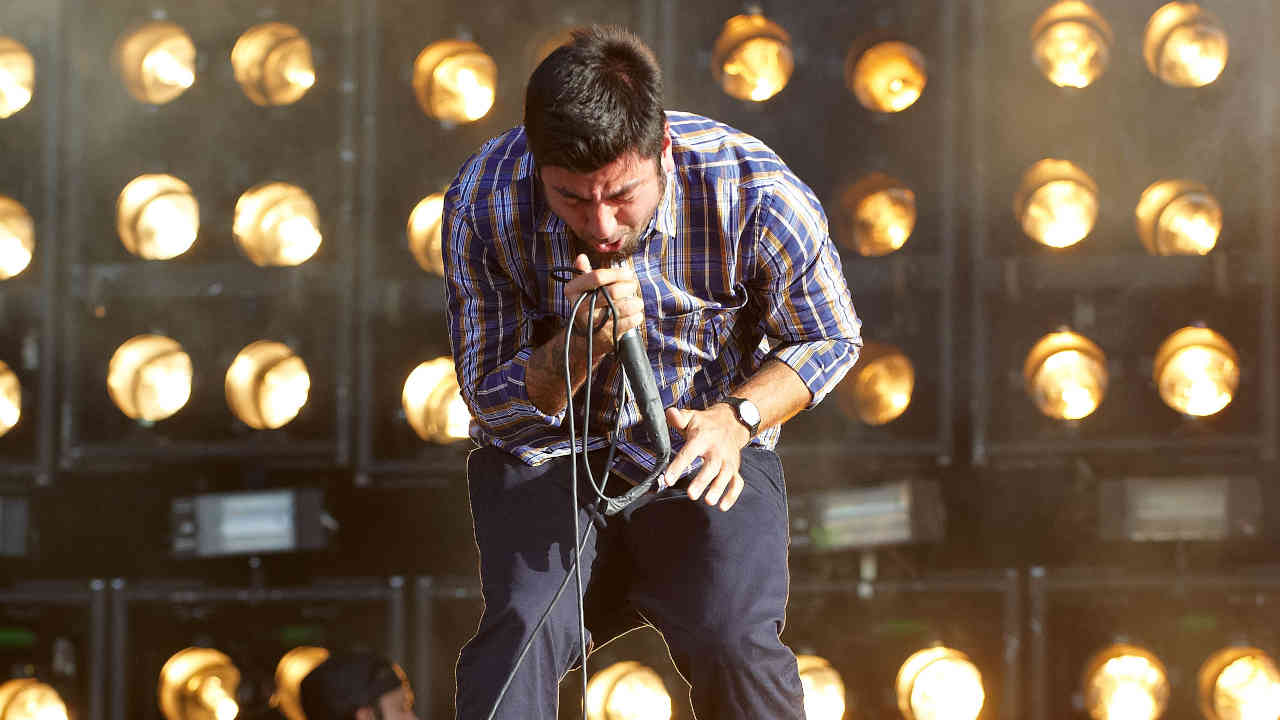
But through all of the heartbreak comes Diamond Eyes. A defiant and uplifting listening experience, it stands up as one of the greatest albums of the band’s career and hind- sight could well prove it to be a milestone in modern metal.
“We made this album in the wake of Chi’s accident and created something positive in amongst that huge negative,” says Stephen. “What I hear when I hear this record is positivity; it was a fun and enjoyable experience making it.”
“This is the first record in a while where I can’t wait to get out and play these songs for people,” agrees Chino. “We’ll always play the old stuff that people want to hear but there’s lots of this record that feels just as necessary for us to play because we’re so proud of this record.”
Celebrating the 15 years since the release of their debut album, perhaps the biggest testament to the Deftones’ career to date is that they’ve never allowed themselves to become a nostalgia act. They are still creating some of the best work of their lives in 2010. Constantly moving forward, Deftones have never allowed themselves to become cartoon characters for the media like so many of their peers, nor have they ever descended into self-parody. Quite simply, Deftones have been one of metal’s most gloriously creative shining lights for the better part of two decades and they continue to create career-affirming music to this day.
“There’s never been a point where we’ve found a formula and stuck to it or wanted to fit in with what’s cool,” says Chino. “We’ve changed as we’ve changed as people and as musicians and we’ve grown that way and that people have liked what we do is great. We’ll keep evolving, I can promise that.”
Originally published in Metal Hammer issue 205. Since the piece originally appeared, Chi Cheng sadly passed away in 2013
![Deftones - Be Quiet And Drive (Far Away) (Official Video) [HD Remaster] - YouTube](https://img.youtube.com/vi/KvknOXGPzCQ/maxresdefault.jpg)
![Deftones - Hole In The Earth [Official Music Video] - YouTube](https://img.youtube.com/vi/LnI_QIXU058/maxresdefault.jpg)
